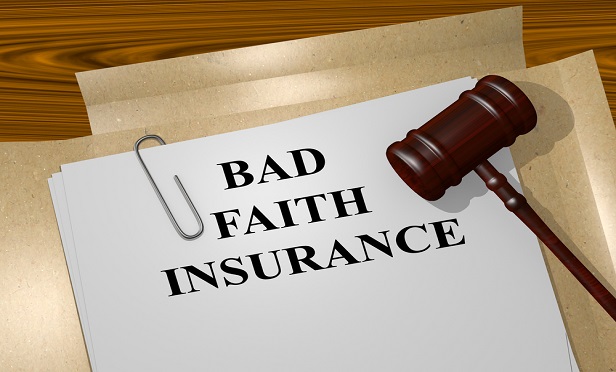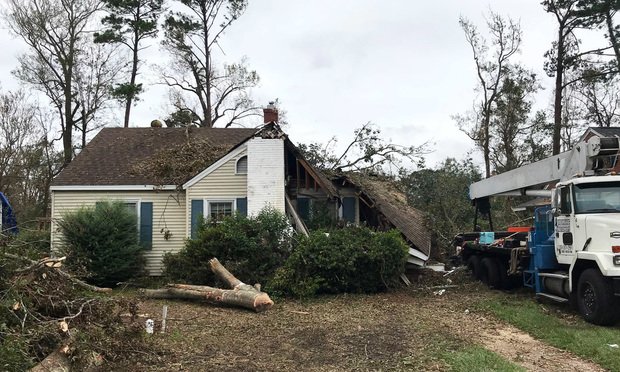This story is reprinted with permissionfrom FC&S Legal, the industry'sonly comprehensive digital resource designed for insurancecoveragelaw professionals. Visit the website to subscribe.
|The Oklahoma Supreme Court — in a case involving what aconcurring justice referred to as an insurer's “appalling conduct”— has expanded the ability to bring bad faith claims against workers' compensationinsurance carriers.
|The case
On Sept. 10, 2014, Tracy Meeks filed a petition in an Oklahomastate court alleging that Southside Recycling LLC, through itsinsurance carrier, Guarantee Insurance Company, had in bad faithengaged in a systematic pattern and practice of refusing to paycourt-ordered temporary total disability (TTD) benefits on 26separate occasions, without just cause.
|In support, Meeks relied on various previously entered TTDorders by the Oklahoma Workers' Compensation Court (WCC). Inparticular, Meeks proffered a June 26, 2014, WCC order thatstated:
|The Court previously determined, andordered, that claimant was, and is entitled to temporary totaldisability payments. The Court ordered respondent to pay suchbenefits and respondent had repeatedly failed to comply with theCourt's orders.
|The Court has given respondent theopportunity to provide just cause as to its refusal or failure tocomply with the Court's orders in this matter, and respondent hasfailed to satisfy its burden in that regard resulting in the courtordering this respondent to pay penalties and interest in its APRIL15, 2010, AUGUST 18, 2010, SEPTEMBER 30, 2011, JANUARY 4, 2012,JUNE 15, 2012 AND OCTOBER 12, 2012 orders.
|Respondent continued to fail to complywith the Court's order for payment of temporary total disabilitybenefits to claimant and now on this 19th day of JUNE 2014, thiscause came for consideration, and after hearing arguments ofcounsel, the Court FINDS and ORDERS AS FOLLOWS:
|THAT respondent has again, withoutjust cause, failed to comply to pay claimant temporary totaldisability payments since the last order of OCTOBER 12, 2012, … fora total of twenty-six (26) separate occasions.
|No 'outright refusal'
Guarantee Insurance moved to dismiss Meeks' bad faith petition,contending that he had failed to follow the procedural requirements under the OklahomaWorkers' Compensation Act before filing the bad faith action.Guarantee Insurance contended that a bad faith action could bepremised only upon a carrier's “outright refusal to pay acompensation award,” noting that it ultimately had paid theawards.
|The trial court sustained the insurer's motion to dismiss.Although the trial court acknowledged that the June 26, 2014, orderhad made detailed findings of fact about Guarantee Insurance's 26separate occasions in failing to comply with the WCC orders absentgood cause shown, it noted that Guarantee Insurance had satisfiedall prior awards prior to the WCC hearing.
|The dispute reached the Oklahoma Supreme Court.
||The Oklahoma Supreme Court's decision
The state Supreme Court reversed, ruling that Meeks couldproceed in the trial court on his bad faith claim against GuaranteeInsurance for its alleged bad faith refusal to provide TDD benefitsas ordered by the WCC.
|In its decision, the court explained that a trial court mayexercise jurisdiction in an employee's bad faith action against hisor her employer or insurer when that employee had obtained a WCCorder certifying “that a final workers' compensation award either(1) remains unpaid or (2) benefits have not beenprovided as ordered” without good cause.
|The certification order, the court continued, was the vehiclethat conferred jurisdiction on the trial court.
|The court then pointed out that the WCC had found and hadexpressly held that General Insurance had been ordered to paybenefits, had repeatedly failed to do so as ordered, and had notprovided just cause for its failures. According to the court,General Insurance's actions placed it “squarely within the scope ofthe second category for certification.”
|Therefore, the court held, the June 26, 2014, WCC order, findingGeneral Insurance in violation on 26 separate occasions in its dutyto comply with previously authorized TTD benefits absent goodcause, satisfied the certification prerequisites permitting Meeksto begin a bad faith action against General Insurance —notwithstanding that the insurer had made the required paymentsprior to the WCC hearing.
|The case is Meeks v. Guarantee Ins. Co.
|FC&S Legal comment
A concurring justice wrote a separate opinion “to emphasize theappalling conduct” that led to Meeks' suit against GeneralInsurance:
|On June 25, 2008, Appellant Tracy Meeks suffered an on-the-jobinjury with Southside Recycling, who was insured by the DefendantGuarantee Insurance Company. By order of April 15, 2010, Mr. Meekswas awarded temporary total disability benefits, payable at therate of $299.00 per week for a period of 156 weeks. On more thantwenty-six (26) occasions, Guarantee Insurance refused topay the benefits. Counsel for Mr. Meeks was forced to make multipletrips to the court to seek additional orders for payment. Someorders included a 15% penalty and interest. This pattern continuedfor several years.
|On June 26, 2014, the Workers' Compensation Court of ExistingClaims [] issued the final order on arrearages, finding thatGuarantee Insurance had failed to pay benefits in the amount of$8,940.10 without justifiable reason. The claim was eventuallysettled. For a period of over four years, Guarantee Insurancehabitually ignored valid court orders to pay benefits. The facts ofthis case are outrageous, and this is exactly the reason why aclaimant must have a common law remedy of bad faith. In spite offlagrant violations of multiple court orders over a period spanningfrom 2010 to 2014, Guarantee Insurance was merely held in contemptand assessed penalties and interest over and over again…. GuaranteeInsurance's continued conduct evidenced intentional, malicious, andbad faith refusal to pay multiple awards, and neither the paymentof the arrearages and penalty nor the settlement stands as a bar toan action for bad faith.
|Steven A. Meyerowitz, Esq., is the director ofFC&S Legal, the editor-in-chief of the Insurance Coverage LawReport, and the founder and president of Meyerowitz CommunicationsInc.
Want to continue reading?
Become a Free PropertyCasualty360 Digital Reader
Your access to unlimited PropertyCasualty360 content isn’t changing.
Once you are an ALM digital member, you’ll receive:
- All PropertyCasualty360.com news coverage, best practices, and in-depth analysis.
- Educational webcasts, resources from industry leaders, and informative newsletters.
- Other award-winning websites including BenefitsPRO.com and ThinkAdvisor.com.
Already have an account? Sign In







